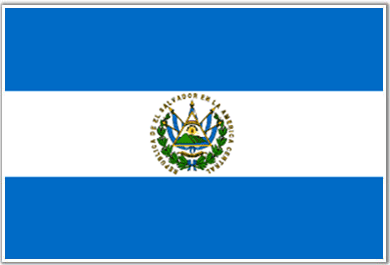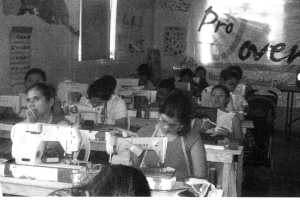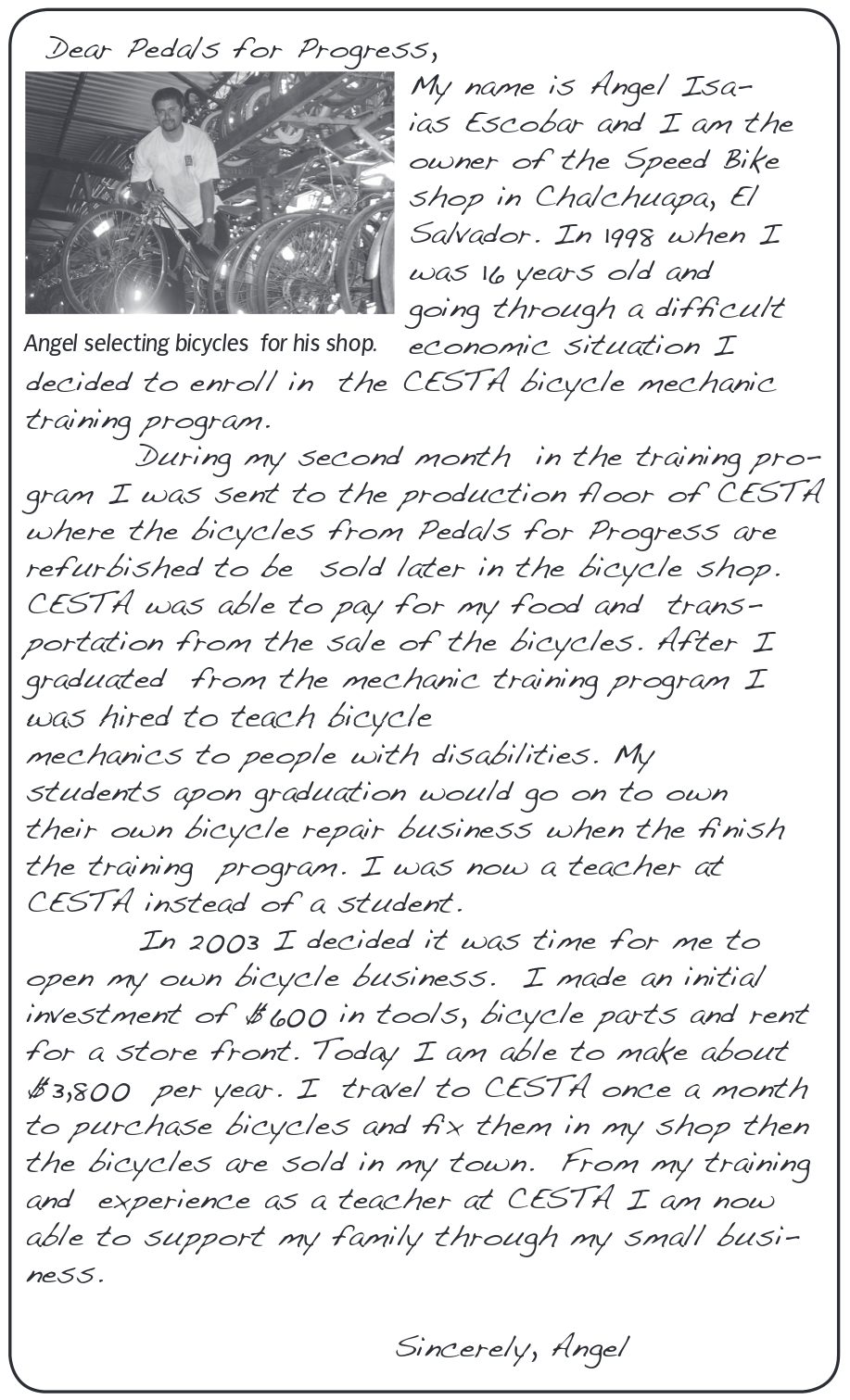Category Archives: El Salvador
Salvadoran Appropriate Technology Center
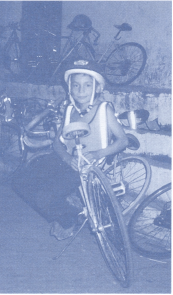 Naum Antonio Recina Halas was hooked as soon as the fleet of cyclists passed his shoulders, shouting as they navigated the concrete cobblestones of the town of Suchitoto, El Salvador. For three successive weeks at the same hour, they rode by, and Naum admired the confidence with which they made their way down the street on the way out of town. A second-grader himself, and still shy of eight, he could see that they were older, but as he knew some of them from the streets of town and one of them was probably a distant cousin, his curiosity and desire soon got the better of him. After the third weekly pass, Naum found two of the boys hanging out-wheel less-in the town park, and, working up his courage, asked about the cycling group, and how one got to ride.
Naum Antonio Recina Halas was hooked as soon as the fleet of cyclists passed his shoulders, shouting as they navigated the concrete cobblestones of the town of Suchitoto, El Salvador. For three successive weeks at the same hour, they rode by, and Naum admired the confidence with which they made their way down the street on the way out of town. A second-grader himself, and still shy of eight, he could see that they were older, but as he knew some of them from the streets of town and one of them was probably a distant cousin, his curiosity and desire soon got the better of him. After the third weekly pass, Naum found two of the boys hanging out-wheel less-in the town park, and, working up his courage, asked about the cycling group, and how one got to ride.
The response was positive, if a bit skeptical at Naum’s youth and small stature. “Go ask at the Mayor’s Office,” said the first. “Or wait for us next time we ride, and ask the ride leader,” said the other. Naum could not wait; he immediately headed down to the office of the alcalde, located only a block away. At the Mayor’s Office, Naum inquired about the “mobile school”, as the other boys had referred to it. The secretary smiled and told him that a woman from the capital, San Salvador, came, selecting participants recommended by the Mayor, and provided training on bike safety and maintenance. In addition, participants could join in afternoon round-trip rides to neighboring communities.
Naum’s eyes lit up. Structured recreational opportunities are few for young boys and girls in rural El Salvador. Although Naum had once ridden a bike, that had been a long time ago, and he hadn’t had the opportunity since. Few children in Suchitoto owned a bike. Fewer still had the opportunity to visit neighboring towns, by any means of transportation (Naum himself had never been to the capital, only 35 miles away). In spite of his young age, or perhaps because of it, Naum insisted he could do everything that was required: demonstrate an ability to ride under control, learn basic safety and repair skills, and keep up with the older youths. Did the program have a bicycle his size?
Fortunately, it did. A container of donated used bicycles and new spare parts had cleared Salvadoran Customs a few months previously, and the non-profit organization running the program—the Salvadoran Appropriate Technology Center (CESTA)—was still digesting the contents. The bulk of the shipment was destined for CESTA’s mechanic training and small-business support program. A lesser portion, about 20 percent, was to go to the Mobile School youth program. Among the 479 bikes received were a selection of children’s bikes, and one was found to fit the young Salvadoran.
Naum quickly proved his capacity, and soon was invited to participate in a ride to the neighboring community of San Martin, some 20 km. distant. A group of 20, including two young adult leaders, one on a bike and one in an accompanying vehicle, set off. All cyclists wore helmets and safety vests provided by CESTA out of the Pedals for Progress shipment They proceeded in single file along the paved but narrow and shoulder-less road. As the topography was downhill from Suchitoto, they arrived easily in less than two hours, pausing to snack and tour the town.
Then began the ascent back home. Long straightaways appeared deceptively flat, rising imperceptibly at first but ultimately taking their physical toll on the tiring cyclists. At breaks, several riders opted to throw their bikes in the back of the pick-up, gratefully accepting a ride. Naum, however, stuck to his one-speed the entire way, and pulled into Suchitoto along with the main body of cyclists just as dusk began to make its presence felt.
A feeling of satisfaction and achievement permeated the entire group, but especially Naum. The older companions congratulated the second-grader. Then, after a few minutes rest on the steps of the Mayor’s Office, they all shouldered their bikes up the steps into the courtyard, locked the equipment away, and scattered for home.
The Mobile School provides selected rural Salvadoran youth with an opportunity to get healthy exercise, be part of a group, travel (including a bus trip to CESTA’s mechanic training site in San Salvador), and learn basic bicycle mechanical and safety skills. It provides CESTA with an opportunity to work with small-town mayors, complementing the non-profit organization is solid waste collection and recycling efforts.
P4P Partners with Airline Ambassadors to Deliver Sewing Machines to El Salvador
Fall 2007 InGear

In late spring, P4P was contacted by Airline Ambassadors. They were looking for sewing machines to send to their charity program in El Salvador. Airline Ambassadors International is a 501(c)3 nonprofit organization affiliated with the United Nations and recognized by the U.S. Congress. It began as a network of airline employees using their pass privileges to help others and expanded into a network of students, medical professionals, families and retirees who volunteer as “Ambassadors of Goodwill” in their home communities and abroad. Members share their skills and talents to care for others and bring compassion into action.
By mid-July, P4P delivered a pick-up truck full of sewing machines to the American Airlines Cargo Terminal at Newark Airport. They were delivered later that week to a Kiwanis Village in San Salvador, El Salvador, where 25 women will train as seamstresses, and upon completion of the course keep their machines.
This fall, we will deliver another 30 machines to El Salvador with Airline Ambassadors. This is an efficient and effective way for our sewing machines to get to the people that really need them. We were fortunate to find such a great synergy with a partner. To learn more about the Airline Ambassadors, visit them at airlineamb.org.
Letter from Angel Escobar: from Student to Teacher to Business Owner
Fall 2006 InGear
We recently received a letter from Angel describing his experience with our El Salvadoran partner CESTA.
For more information on CESTA’s bicycle program, click here.
CESTA: P4P Partner in El Salvador
24,457 bikes (1995–2012) and 536 sewing machines (2000–2012) shipped
 CESTA stands for the Salvadoran Center for Appropriate Technology. CESTA was founded in 1980 by a group of Professors from the University of El Salvador as a professional organization to promote forms of technology appropriate to the social and environmental conditions of El Salvador. Now the organization is a public foundation with the capacity to execute environmental projects.
CESTA stands for the Salvadoran Center for Appropriate Technology. CESTA was founded in 1980 by a group of Professors from the University of El Salvador as a professional organization to promote forms of technology appropriate to the social and environmental conditions of El Salvador. Now the organization is a public foundation with the capacity to execute environmental projects.
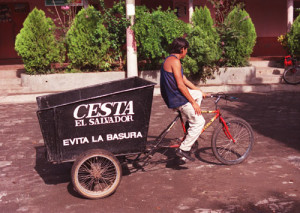
The main objectives of CESTA are to:
- Encourage Salvadorans to adopt lifestyles compatible with the sustainability of the country.
- Protect humans, animals, and habitats from deterioration and destruction and to enhance their existence by recovering lost ecological balance.
- Include different sectors of society in the fight for sustainability.
CESTA’s areas of interest include agriculture, forest biodiversity, climate change, and solid and toxic waste.
One of CESTA’s oldest programs is its bicycle workshop, EcoBici, which teaches bicycle repair and encourages bicycle use: for transportation, for its low cost, for its health benefits, and for its benign environmental impact.
Our Training Centers
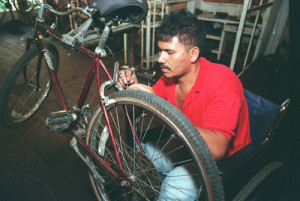
Thanks to the support of organizations like Pedals for Progress and Bikes not Bombs, every couple of months we receive containers of bicycles that are used as educational instruments for our students who are learning how to repair bicycles. The training period is no longer then 6 months; within this time they must learn everything from aligning a tire rim to general bicycle repairs.
Click here for an English language description of CESTA from Común Tierra.

